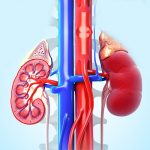Healthy Kidneys
If beans were the size of a fist, they would resemble the human kidney. Located in the abdomen below the ribcage and behind the stomach, the kidneys are part of the urinary system that also houses the ureter, bladder and urethra. In medical circles, extensions of the word “renes” refer to kidney-related issues.
The kidneys help purify the blood and flush out waste such as urea, uric acid, drugs, their metabolites, and toxins as urine. This excretion process is crucial in stabilizing body fluids and chemicals, regulating body salts and acid, activating the production of red blood cells, and absorption of calcium. They maintain a healthy balance of water, salts, and minerals such as sodium, calcium, phosphorus, and potassium in the blood.
The kidneys secrete certain hormones that help maintain blood pressure and stimulate the function of other organs.
Healthy kidneys are the result of:
Being active and fit
Regular exercise like walking, running, and cycling every day helps to lower the risk of chronic kidney disease, reduce blood pressure and boost heart health.
Controlling blood sugar
Have meals regularly and on time, reduce sugar intake and maintain a healthy weight to help control sugar.
People with diabetes or high blood sugar can suffer damage to their kidneys. In these conditions, the body’s cells cannot use the glucose (sugar) in the blood forcing the kidneys to work extra hard to filter the blood. Years of exertion can lead to life-threatening damage.
Monitoring the blood pressure
Go easy on salty and processed food, and check blood pressure levels regularly.
High blood pressure damages the arteries around the kidneys, making them unable to deliver blood to kidney tissues.
Drink plenty of fluids
Consistent water intake is healthy for the kidneys. It helps clear sodium and toxins and lowers the risk of chronic kidney disease.
It is advisable for people with a medical history of kidney stones to drink an extra quantity of water to help prevent the accumulation of calculus.
Maintain healthy weight
Eat fresh vegetables and fruits, whole grains, fish, nuts, and lean meat.
The chances of overweight or obese people suffering kidney damage are higher.
Avoid smoking
Smoking damages the blood vessels leading to slower blood flow throughout the body, including the kidneys. Smoking also increases the risk of kidney cancer.
Careful with Alcohol
A drink or two may not hurt the kidneys of a healthy person. More than four drinks in less than two hours can cause sudden, serious, and irreversible damage.
Alcohol causes dehydration, which could slow down the functioning of the kidneys leading to liver disease, high blood pressure, and other conditions that put more stress on the kidneys.
Avoid OTC pills
One of the main reasons for kidney damage is the habitual consumption of OTC (over-the-counter) medication. NSAIDs (nonsteroidal anti-inflammatory drugs) like Ibuprofen and Naproxen can also damage the kidneys.
Kidney function test
The following category of people should get a KFT regularly:
- Senior Citizens
- Those who were low-weight at birth
- The obese
- Sufferers of cardiovascular disease
- Those with a family history of high blood pressure





